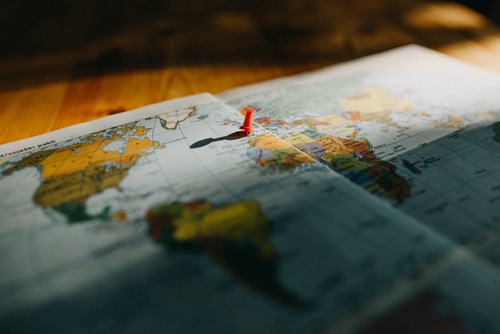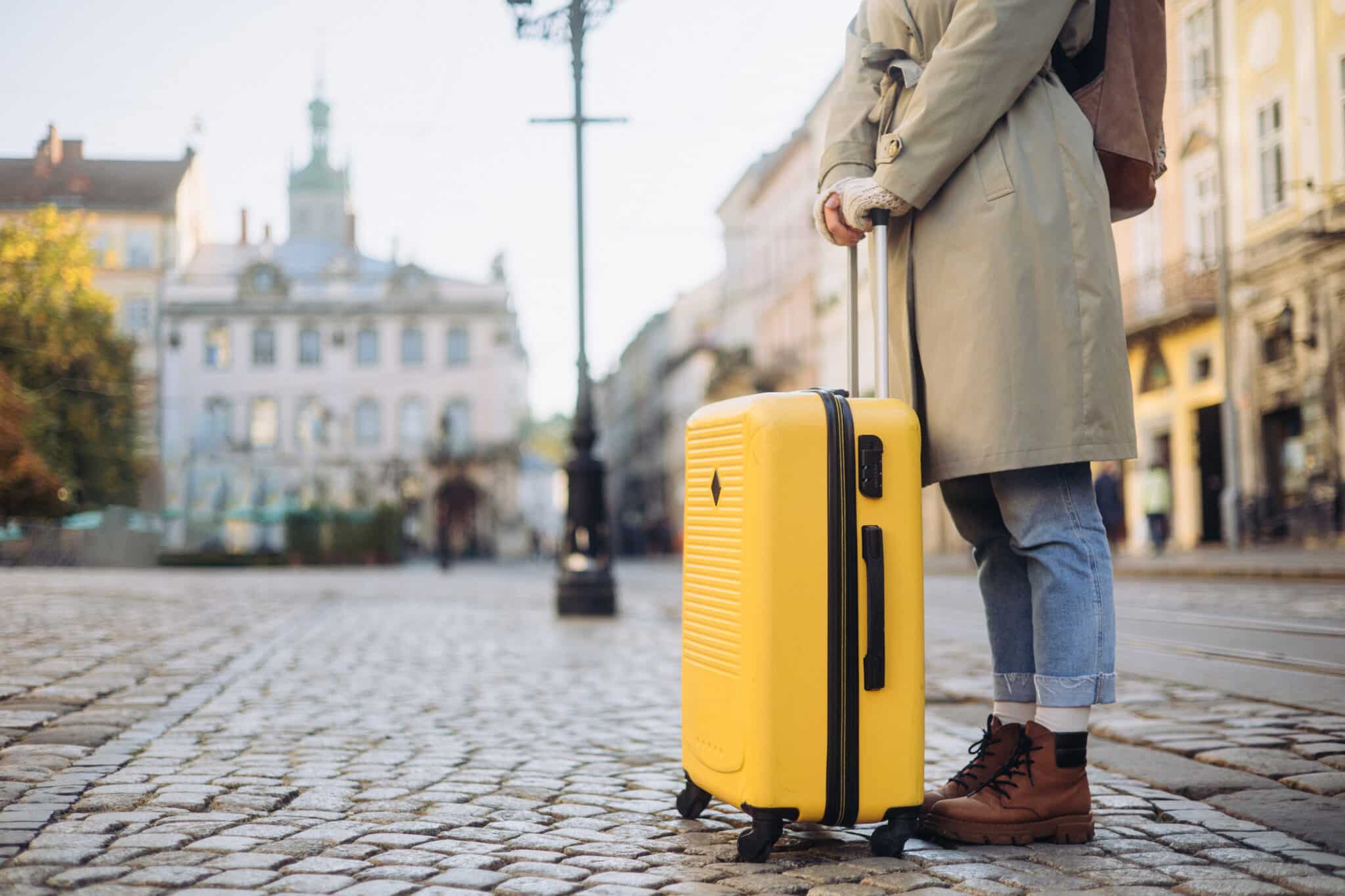Moving abroad is an exciting experience, but it also comes with a wide range of other emotions. You’ll be excited about the life you have ahead of you, but you’ll also feel nervous about your next steps, and even sad about the life you’re leaving behind. Once you’ve moved, you might also deal with culture shock, the experience of feeling out of place, anxious, confused, and frustrated in your new home while you try to adapt.
In this article, we’ll look at what scientists call the four different stages of culture shock, and give you some practical strategies and tools to help work through it, so you can start properly adjusting abroad and settle into your new life.
What is culture shock?
Culture shock is the range of emotional and psychological responses people feel when they move to a new country. The unfamiliar environment and culture can produce feelings of confusion, stress, and disorientation, while also including moments of discovery and curiosity. Simple tasks can seem unexpectedly difficult, and deeper cultural differences can take time to understand.
Imagine you’ve just moved to a big city in a new country. When you first arrive, you’re excited about your new life and enjoy exploring your new home. But suddenly, even simple tasks like grocery shopping feel stressful and overwhelming. The differences from home start to feel bigger than expected, leaving you uncertain about how to adjust.
What are the four different stages of culture shock?
The science suggests that there are usually four stages to culture shock, taken from Olberg’s classic work on the topic. People can experience these stages in different ways and orders but academics tend to agree you might find the following four phases of culture shock:
- The honeymoon phase: This is felt when you first move to a country and everything feels new. It’ll be an exciting and enjoyable experience as you explore the culture and different ways of life.
- The frustration/negotiation phase:Tasks you found simple in your home country start to feel frustrating. Misunderstandings can happen, and you could begin to feel homesick.
- The recovery phase: You’ll start overcoming the challenges you experienced during the frustration phase and become more familiar with the local customs and daily life.
- The adjustment/acceptance phase: Once you’ve adjusted, you’ll feel more comfortable with daily life. You’ll be more familiar with the language and daily basics, and you’ll find a comfortable rhythm.
Each stage can vary in length and intensity depending on the person—you could go through one phase noticeably faster than others, but then stay longer in another. You could also move back and forth between stages, especially when you stay somewhere for a long time.
Is there a fifth stage of culture shock?
While not as commonly cited in the research, some analyses will highlight five stages of culture shock rather than four. The key difference is that there might be a ‘mental isolation’ phase before acceptance. This isolation sees people particularly focusing on comparing their current environment to their familiar home equivalent. This is especially true for students, as discussed by the Mayo Clinic. For our guide, we will focus on the four steps, but importantly, this does not mean that those facing the mental isolation period are following any form of incorrect path.
Why culture shock is normal
Culture shock is a common and normal experience when moving to a new place. It’s how you process a major change in environment, culture, and routine. Culture shock can be challenging, but it also puts you in a position to:
- Build resilience and develop your ability to manage change
- Develop your problem-solving skills
- Adjust to a new situation and adapt to the local norms
Many people go through some kind of culture shock. Although it can feel difficult—particularly in the frustration phase—working through it can help you grow as a person, become more empathic, improve your communication skills, and expand your horizons.

Practical strategies for coping with culture shock
Although culture shock can sometimes feel overwhelming, the right strategies can make adapting to life abroad feel more straightforward. Let’s take a look at some things you can do to help you adjust as quickly as possible.
1. Learn the basics before you go
The more you know about a country, its culture, and its local traditions, the easier it’ll be to adjust. The local language is a good place to start, and language-learning apps like Duolingo, Babbel, or Memrise can help. There could even be language courses in your hometown.
You can also find out about transport, money, and healthcare. There are plenty of online resources that help you find out as much as possible about a country ahead of your move. Try to take advantage of these things so that you know something about what to expect when you move.
2. Create a routine
Most of your new life will feel like a major change. However, you’ll already have habits that you can keep doing no matter where you live. An exercise routine is a great example of this.
Think about what’s already part of your daily routine and try to maintain it once you’ve moved. It can offer a greater sense of familiarity and stability in your new home. This can be comforting when you’re adjusting to your new life and getting familiar with local customs. At the same time, try adding new routines based on your new country’s lifestyle, like adjusting to meal times and trying out new hobbies.
3. Build connections
One big driver of culture shock is the initial lack of social connection. Addressing this and building your network is a key part of adjusting abroad. Community events and support groups are a great start.
There are also online platforms that can help, such as Facebook Groups and Meetup. Why not get a head start and join some groups before your move? It could help kickstart your social life and give you the chance to build some local connections before you arrive.
Tip: Join local expat groups to help ease the transition and reduce culture shock impacts, to learn how to find these, see our guide on the best expat groups around the world.
4. Keep an open mind
It’s natural to have preconceptions about what life abroad will be like, and it’s easy to compare local customs and traditions to those at home. However, try to keep an open mind and embrace new experiences without judgment.
Be inquisitive and show respect for local customs. Ask questions—you’ll probably find that local people are more than happy to explain things. These traditions are important in your new country, and the more familiar they are, the easier it’ll be to settle in.
5. Maintain communication with loved ones
Moving abroad doesn’t have to mean losing touch with friends and family back home. Maintaining regular contact with them as you adjust can help more than you might expect, especially when you’re settling in. They can offer emotional support during the process, helping to ease the challenge of culture shock.
Technology makes this easy, and there are plenty of apps to video call your loved ones. Keep in touch as much as you need—just try to balance this with making connections in your new home.
6. Practice self-care
Adjusting to life abroad can be physically and emotionally draining, especially at first, so it’s important to make sure you’re looking after yourself. The following can help:
- Maintaining a healthy diet
- Quality sleep each night
- Regular physical exercise
- Taking time to relax
Looking after your body and mind creates a strong foundation for adjusting to your new environment.
How to integrate into a new culture
Making efforts to find your place in your new culture can be an effective way to kickstart your new life and help you feel a part of the community. Try these strategies to help you feel less like an outsider.
- Observe social norms: This includes social etiquette, local slang, and even the typical way of greeting friends and new acquaintances. Mirroring these helps with integration, and over time, they’ll become second nature.
- Explore through food: Every country has its culinary specialties, and these are an important part of its identity. Trying out local cuisine can be a great—and tasty—way to better understand the local culture. You could also buy local produce and try cooking typical dishes at home.
- Take part in daily life: Go to local markets, use public transport, visit local sites, and be sociable. It can help you feel part of the community.
- Celebrate local traditions: Local festivals and traditions are a valuable part of a country’s culture. Celebrating and taking part in these traditions is a great way to learn.
- Learn the local language: This is one of the key things you can do to build connections. It’ll take time, but even a few phrases can go a long way.
When to seek additional support
It’s natural to feel a little overwhelmed when adapting to life abroad. If it starts to affect your mental health, it may be time to seek additional support.
Here are some options to consider:
- Lean on your loved ones: Family and friends may be a good starting point, even if they don’t fully understand what you’re going through.
- Community support systems: Many places have community support systems and groups to help people adjust—and could even be a way to meet new people. Check out local community or expat groups on Facebook or Meetup to see what’s available where you are.
- Professional therapists: Therapists can be a useful way to navigate the challenges of moving abroad. Look out for therapists that specialize in working with expats and helping them through the process of culture shock and settling into life abroad.
- Online counselling platforms: If in-person therapy isn’t accessible for you, online counselling platforms can be a great alternative. Some options are BetterHelp, Talkspace, and Cerebral.
By reaching out, you’re not only looking after yourself but also accessing tools to feel more confident in your new life.

Resources for those navigating culture shock
Online guides for culture shock
Online guides: Find guides specific to the country you’re navigating, some examples for popular countries below:
- British culture and culture shock, Bournemouth University
- Facing culture shock, UK Council for International Student Affairs
- Culture shock, Australian Cultural Orientation Program
- Adjusting to life in Australia, Western Sydney University
- How to cope with culture shock and homesickness, European Employment Services
- Culture Shock: A Guide for International Students, Centre for Innovation in Campus Mental Health (Canada)
- Culture Shock in Japan, Expat Exchange
Governmental support
Governments and organizations offering support for migrants: Some examples of specific Government pages offering su[port can be found below but you can also search for your specific country online.
- International Social Services Japan
- Federal Ministry of Labour and Social Affairs, Germany
- Migrant Help, UK
- Government of Canada, Immigration, Refugees and Citizenship
- The French Office for Immigration and Integration (OFII)
Support via university and college
Educational institutions: If you’re a student, speak to your college or university’s support team. They will have helped thousands of students with culture shock over the years and can offer in-person support, which is usually included with your tuition fees. Seek out people in your institution who work in welfare support, mental health, international student support etc.
Your next steps abroad
Culture shock is a common part of adjusting to life abroad. It usually comes in stages—honeymoon, frustration, adjustment, and acceptance—though not everyone experiences them in the same way. As challenging as it can seem at times, it’s a natural process that many people deal with.
Practical strategies—like having a routine, learning local customs, and creating a support network—can make a big difference, helping you navigate the process and focus on getting settled and building a life in your new home.
FAQs
What are the common symptoms of culture shock?
Homesickness is one major symptom of culture shock. Others include frustration, disorientation, and a sense of loneliness.
How long does culture shock last?
This varies from person to person. Some people might adapt within a few weeks, but others may need several months, or even longer. Certain factors can affect this, like whether your native language is spoken in your new country, or how different the new culture is from your own.
What is reverse culture shock?
Reverse culture shock happens when you move back to your home country from abroad and have difficulty adjusting back into your native culture. It feels similar to traditional culture shock, but in reverse.
Can children experience culture shock?
Yes. Children can experience culture shock as much as adults do, although they may adjust more quickly with support from parents and their new school.
Are there any apps to help with culture shock?
Yes. Duolingo can help with learning the language, while Meetup lets you find locals and other expats in your new country. Google Translate or DeepL can be useful for navigating a new language, and well-being apps like Headspace or Calm can help you manage stress.
